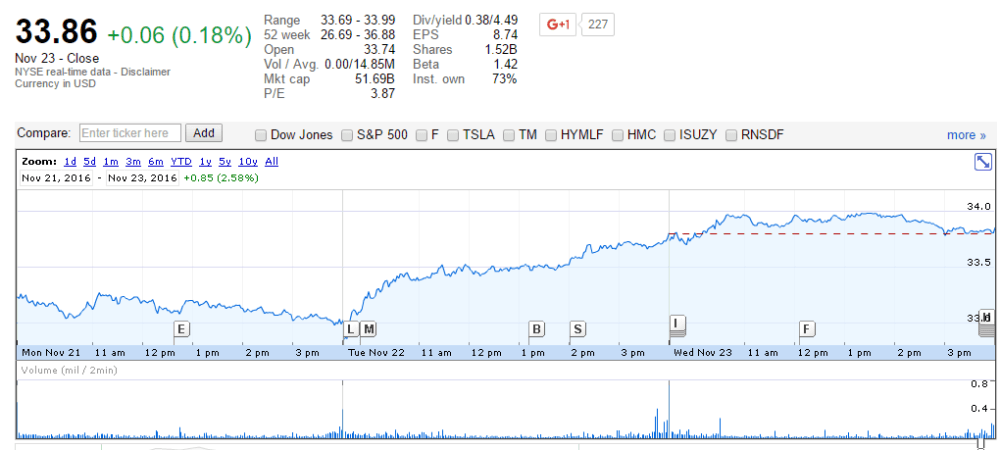Urban wasteland or land of opportunity? As Detroit rises back to glory, should retail FX firms offer Motown stock?
As the City of Detroit enjoys a wholesale resurgence, why are FX traders and brokerages not looking more closely at the stock of the big three legendary motor manufacturers? We take a look and make some out-of-the-box suggestions

They make cars in Birmingham. They make cars in Paris, Gothenburg and Turin. They even make cars in Hiroshima.
There is, however, only one motor city.
Detroit. Motown.
From the era of great hope during the 1950s as America mobilized itself during the period in which fresh-faced baby boomers took to the roads in jet-age inspired Bel Airs and Fairlanes, through to the muscle car era of the 1960s when a 25 year old postgraduate could put an eight-cylinder Mustang on the road for just a few thousand dollars, and select imagination-capturing options such as pony hide trim from the (at the time very rare) extensive options list.

The three automotive giants whose businesses boomed into giant corporations not only adorned the northern Michigan and Southern Ontario landscapes, but dominated them. Ford, General Motors and Chrysler were producing the iconic legends that featured in idealistic movies, yet still powered America’s trips to grocery stores, offices and baseball matches.
Detroit’s music scene revolved around the automotive industry, spurning an entirely new genre, named after the world’s most iconic motor city under the Motown moniker.
Whilst the Eldorados and Continentals of the 1950s and 1960s were inspirational dream machines, today, the evocative names have given way to more subtle ones, and the respective Cadillacs and Lincolns are made by robot, hence Detroit’s glory years having been decimated, with widespread dereliction having set in during the course of the 1990s.
Unemployment took hold, and the Auto Workers Union’s blank-check policy of protecting factory workers took its toll as motor manufacturers had to pay gold plated pensions to people who had retired over 20 years previously to luxurious AWU villages, and meanwhile South Korea and Japan were not only importing very cheaply made products en masse, but were building factories from Ohio to Georgia in which to assemble them.
Share prices dropped, but hope was never lost.
Now, in 2016, Detroit is enjoying a massive resurgence and industrial revival.
This time, however, just as in the 1950s, it is a modern, technologically advanced revival on a massive scale.
As one of the founding fathers of Detroit’s renowned automotive industry, Louis Chevrolet, Swiss racing driver and co-founder of General Motors Corporation once said “Never give up”.
Long consigned to distant memory are the industrial difficulties highlighted in Mark Knopfler’s “Telegraph Road”, where he outlines the daily reality of a car industry factory floor worker whose difficult life was peppered by industrial disputes, lack of resources and inability to retain a workforce as Mark Knopfler’s lyrics focused on one man’s personal struggle with unemployment after the city built around the Telegraph Road had become uninhabited and barren just as it began.
The Telegraph Road itself is a journey between vast car factories. Flint, Lansing, Toledo, Ann Arbor, Port Huron, Hamtramck, Flat Rock, Pontiac, Dearborn, Erie and Brownstown are all suburbs along the Telegraph Road that have for decades produced America’s finest.
Ford and General Motors are right at the top of the league, building world class, top quality and highly sophisticated products. From the switchless dash of the Lincoln MKZ, which looks like it comes straight from the future, to the flexfuel and energy saving hybrid and electric motive power that now provides in many cases over 300 bhp to fuel efficient and yet luxurious products.
General Motors Corporation reported record profits during its third quarter earnings and revenue report at the end of October this year.
The company, once the largest corporation in the world, announced $2.8 billion in net income, up 104%, attributing this milestone to massive increases in retail sales in the United States domestic market.

Americans are buying American cars once again. Not just cars made and designed in America such as the ever popular Toyota Camry, but American products from the big three famous Detroit names.
The demographic of Detroit is becoming discerning, and there are little signs of desperation. In recent years, new fashionable venues, from a bagel shop to a late-night Middle Eastern restaurant have popped up at a surprising rate in Detroit. Since the summer of 2015, at least eight new bars and restaurants have opened in a fairly small stretch, so fast that an increasingly walkable entertainment district seemed to appear in the blink of an eye.
The younger generation is a generation of hope, not acceptance. The apathy of the 1990s has gone. The bland, smaller, emissions-emasculated products that rolled off the production lines during that decade as an indicator of Detroit’s resignation to defeatism are long gone and evocative, world-class products are now proudly displaying the famous blue oval or bowtie logos, designed by sophisticated urban youth and top level engineers with MIT engineering degrees.
Looking at General Motors’ share prices, the upturn is apparent, therefore the question is, in equities and indices-focused America, why aren’t retail FX brokerages capitalizing on this massive resurgence of one of America’s most famed industrial successes.
Certainly, exchange-listed derivatives venues and the platforms and market makers attached to them in Chicago are already very much aware of this and traders are indeed in full swing when it comes to domestic auto manufacturers, however with such a bright future which is evident by the stock prices, the regeneration of a city whose entire soul (musical and cultural!) rose from the motor industry, OTC firms could do well to go boldly into automotive stock.
Diversification of asset classes is a much discussed subject currently, as is mitigating the risks posed by sticking solely to liquid and often volatile currencies, and having to deal with the conundrum of forging very complex Prime of Prime relationships as Tier 1 banks concern themselves with counterparty credit risk.
Food for thought. As a lifelong American car loyalist, I am pleased to see the city that captured my attention and encouraged my hobby and interest once again looking forward to a good future. Now it’s time for the trading world to capitalize on it.

Featured image: 2016 Cadillac Escalade. Credit: General Motors Corporation









